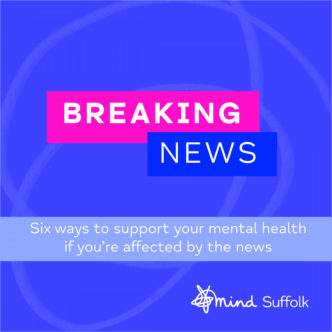Stress, sleep and current affairs
Distressing news can be a source of worry and concern. Our emotional needs for security and control can be impacted by these situations.
The more we worry and over-use our imagination to catastrophise about the future, the more likely it is that our sleep will be affected. Our brains use dream sleep (REM) to clear out the emotional charges of the day, so the more that worries, angers or stresses us, the more dreaming needs to be done. This can leave us feeling more tired the next day because as we dream more, we get less deep regenerative sleep.
Our staff have been supporting more people recently who are worried by events in the news. To them, and the general population, we are suggesting the following steps:
· If you can, donate items to an organised collection and engage with local Suffolk refugee organisations supporting Ukrainians. These kinds of practical actions can connect us with meaningful efforts to bring about change for the better, giving us meaning and purpose.
· Accept that there are things we cannot control by making a list of things you can control, like where you’re going to go for a walk today, what time you’ll make yourself something to eat, what colour socks you’re going to wear, and so on. Then, throughout the day, focus attention on the list of those things you can control.
· Avoid doom-scrolling, which is the term psychologists use when we look for updates and find ourselves in a cycle of negative news stories, impacting our need for security. This keeps the ‘fight-or-flight’ response switched on and our brain looking out for more signs of danger. This can keep us in a constant state of worry, which can then tip us into anxiety and depression.
· Protect yourself by limiting the time spent on the news to ten minutes a day. This can enable you to gain some control over the situation.
· After reading or watching a negative news story, take the time to do something relaxing, like breathing exercises or going for a walk in the park, or reading some fiction. Movement burns off the stress hormone, cortisol, which can in turn help us achieve better quality sleep.
· Practice kind-scrolling by searching for positive news stories which give us a more optimistic view of the world.
Help is at hand to get better sleep
For more information on how to meet your need for sleep, take a look at our resources hub for more blogs and support.
You can also sign up to become a Friend of Suffolk Mind, which gives you the opportunity to join our Sleep Well, Work Well workshop for free.











